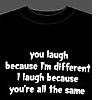"On the Contrary" is an occasional feature in which I look at a widely accepted idea about writing and publishing and give an opposing or at least alternative view. This post was originally a commnet on another blog.
I was on Rachelle Gardner's blog, and a comment to a recent post there struck me. Cheryl Lewis, a freelance writer and editor recounted her experiences working with self-published authors. Often, she would put substantial effort into helping them create a quality work, and then watch, frustrated, as they reverted the work back to something much closer to the original.
I was moved to respond to her as reproduced below. It seemed to me that my thoughts on commercial salability versus integrity of voice would be worth posting here. So enjoy:
Cheryl, my first impulse is to say that I think you were wrong and your clients were right. But my second thought is to frame the issue in different terms. I think you and your clients may have had different goals.
Let me give my own perspective. I'm an aspiring novelist, and I came to that highly unlikely role because I conceived of a story that I thought needed to be told. It was the story that drove me to write - not the desire to write that led me to seek a story. My goals in this story are to construct it so that it will (hopefully) touch the lives of its readers. This is not necessarily compatible with a maximum degree of salability. The audience to whom I want to speak is unknown in numbers, but I expect it to be a relatively small niche audience. It is quite possible that the work as I have conceived it will not be viable as a commercial product.
Should I then allow it to be edited for salability? I'm completely okay with editing that will help the work be more effective at what I intend it to accomplish. I would not be okay with editing it into a different work, even were that edited work to become a best-seller. (I would even be okay with editing for salability as long as the character of the story remained intact. More audience is good.)
I think what I'm addressing here may be that elusive quality caled "voice". It sounds, from what you recount, like you were editing your clients' work for a more salable voice. I suspect the problem they had was that the resulting voice was no longer theirs.
People who approach writing from a commercial or "business" perspective may overlook the reality that there are other reasons for writing. I think the proper role of an editor is to assist the client in realizing their goals for the work. Those goals may not necessarily include a spot on the best-seller list. If the goals of the writer and the professional standards of the editor are incompatible, I think it's best to get that out in the open up front. Not every writer and editor are a good partnership any more than are every writer and agent.
I hope you don't see this as a hostile response. I'm reacting in part to the substantial amount of story constructing advice I've seen on various sites which, if I tried to follow it, would change my novel into something I would no longer consider worth writing.
Best wishes for your work,
-Steve
-Steve

No comments:
Post a Comment